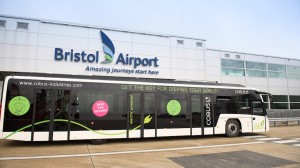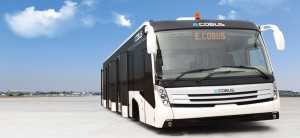Passengers boarding flights at Bristol Airport are travelling between the terminal and their plane by electric bus in the latest trial scheme to reduce its emissions.
The airport announced its ambition last month to become Net Zero by 2030.  If it is successful, Bristol would be the first UK airport to do so.
If it is successful, Bristol would be the first UK airport to do so.
Bristol said its focus was on continual improvement, embracing new and innovative ways of working and ensuring a sustainable future for the airport and the wider region.
Trialling the fully electric 110-passenger capacity shuttle bus, pictured, supplied by German firm COBUS Industries – the global market leader in airport bus transportation and Bristol Airport’s existing supplier – is one area the airport says will help reduce emissions.
It will study the operating benefits of the bus, which includes a lithium titan oxide engine specially developed for use at airports and state-of-the-art features to maximise safety and comfort, against its existing diesel fleet of vehicles.
Similar COBUS buses are already in use at a number of airport around the world, including in Germany, Switzerland and Canada.
COBUS Industries CEO Patricia Vasconcelos said: “Today’s challenges in terms of sustainability and environmentally friendly technologies are intrinsic goals for airport authorities, airlines and ground handling companies.
“The team of COBUS Industries is following this with large ambitions and high motivation to offer passengers the best possible comfort in our COBUS airfield bus and help our customers to drive their ambitious goals towards environmental protection, sustainability and future-oriented technologies on airports. 
“We are very pleased and proud that our valuable and long-term customer Bristol Airport is willing to test our fully-electric COBUS and to continue our partnership.”
Bristol Airport head of sustainability James Shearman added: “We are committed to embedding sustainability principles into the way we work every day, the way we develop and the way we collaborate.
“We are delighted to be working with COBUS Industries in helping deliver our sustainability targets and reducing airport emissions. This is only one project we are working on to achieve being a Net Zero Airport operation by 2030.”
Last month the airport teamed up with airline easyJet, its largest operator accounting for about half of all its flights, for a series of trials using the latest cutting-edge technology and other innovations to reduce their carbon footprints.
The partnership will work with expert associates and firms in the aviation industry to help reduce and eliminate emissions from aircraft ground operations.
It will also challenge the industry to work together to develop affordable and achievable technological solutions.
Projects likely to be considered will look at:
- Electric ground power units
- Sustainable aviation fuels
- Electric passenger coach transportation
- Recycling and waste management
- Employee carbon-saving initiatives
- Supply chain carbon reductions
- Aircraft continuous descent approaches
- Zero carbon emission aircraft turnarounds
- NEO (new engine option) aircraft deployment and fleet optimisation.
EasyJet has a number of 186-seat A320neo aircraft in its 17-strong Bristol-based fleet, which serves its 70-plus destinations.
The airline and airport hope any successful results from the trials will have the potential to be rolled out across easyJet’s entire network, which spans 150 airports across 35 countries.
Bristol Airport’s plan to become Net Zero within nine years has been attacked by the Green Party group on Bristol City Council as ‘utter nonsense’.














